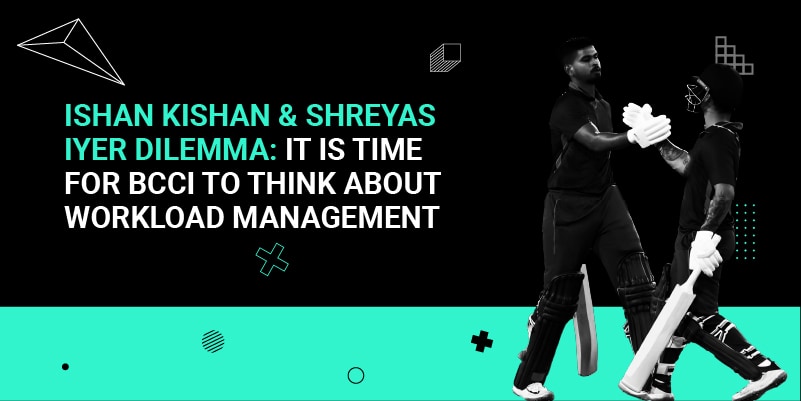Ishan Kishan & Shreyas Iyer Dilemma: Time for BCCI to Think

The Indian T20 squad for the Afghanistan series raised eyebrows with the notable absence of Ishan Kishan and Shreyas Iyer. While speculation swirled about disciplinary issues, the official reasons paint a different picture.
Kishan reportedly requested a break after the South Africa tour, citing mental fatigue. Head coach Rahul Dravid confirmed this and clarified there were no disciplinary concerns. He hasn’t formally made himself available since requesting the break. He’ll likely return to domestic cricket when ready.
Similarly, contrary to media reports, Iyer wasn’t dropped for disciplinary reasons. His absence stemmed from stiff competition within the squad. Selectors reportedly wanted Iyer to play Ranji Trophy after his South Africa struggles.
However, Iyer preferred time off, leading to his omission. Iyer has since committed to playing Ranji Trophy for Mumbai, paving the way for his potential return to national selection.
While the official reasons seem clear, whispers persist. Some reports mention contrasting narratives about Kishan’s activities during his break, while others hint at Iyer’s shot selection concerns not being fully addressed.
Whatever the case is, the two primary players of Team India are facing issues because of fatigue and their selection process has been hampered.
BCCI and the selection committee should take a step back and should start to think about managing the player’s workload management considering the upcoming T20 World Cup, Champions Trophy next year, and the ongoing World Test Championship.
It is Time for BCCI to Think about Workload Management
Cricket has evolved significantly over the years, transitioning from a leisurely sport to a high-intensity, high-stakes spectacle. The advent of T20 leagues, bilateral series, and global tournaments means that players are constantly on the move, participating in matches across formats and continents. While this may be exhilarating for fans, it poses significant challenges for the players themselves, both physically and mentally.
The Indian cricket team, in particular, faces unique challenges when it comes to workload management. With a vast talent pool and a fiercely competitive domestic circuit, the pressure to perform is immense. Players are often selected for multiple formats, juggling between Test matches, ODIs, and T20s throughout the year. This constant rotation not only increases the risk of injuries but also prevents players from achieving peak performance in any particular format.
Furthermore, the rise of franchise-based T20 leagues has added another layer of complexity to the issue. While these leagues provide lucrative opportunities for players to showcase their skills and earn handsome salaries, they also place additional strain on their bodies and minds. The temptation to participate in multiple leagues and maximize earnings can lead to overexertion and burnout, jeopardizing players’ long-term health and careers.
Fortunately, there are several strategies that the BCCI can adopt to address this issue. Firstly, there needs to be greater communication and collaboration between the BCCI, team management, and players’ associations to establish clear guidelines and protocols for workload management. This includes monitoring players’ workloads through data analytics, implementing structured resting periods, and providing access to sports psychologists and wellness experts to support their mental health.
Moreover, the BCCI should consider implementing a centralized scheduling system that prioritizes players’ well-being over commercial interests. This means rationalizing the cricket calendar to reduce congestion and allow adequate time for rest and recovery between matches. It also involves striking a balance between international commitments and domestic tournaments, ensuring that players have the opportunity to represent their country without compromising their participation in domestic leagues.
Workload management is a pressing issue that the BCCI cannot afford to ignore any longer. As the custodian of Indian cricket, it is incumbent upon the BCCI to prioritize the health and welfare of its players above all else.
The Indian T20 squad for the Afghanistan series raised eyebrows with the notable absence of Ishan Kishan and Shreyas Iyer. While speculation swirled about disciplinary issues, the official reasons paint a different picture. Kishan reportedly requested a break after the South Africa tour, citing mental fatigue. Head coach Rahul Dravid confirmed this and clarified there were no disciplinary concerns. He hasn’t formally made himself available since requesting the break. He’ll likely return to domestic cricket when ready.
Similarly, contrary to media reports, Iyer wasn’t dropped for disciplinary reasons. His absence stemmed from stiff competition within the squad. Selectors reportedly wanted Iyer to play Ranji Trophy after his South Africa struggles. However, Iyer preferred time off, leading to his omission. Iyer has since committed to playing Ranji Trophy for Mumbai, paving the way for his potential return to national selection.
While the official reasons seem clear, whispers persist. Some reports mention contrasting narratives about Kishan’s activities during his break, while others hint at Iyer’s shot selection concerns not being fully addressed. Whatever the case is, the two primary players of Team India are facing issues because of fatigue and their selection process has been hampered. BCCI and the selection committee should take a step back and should start to think about managing the player’s workload management considering the upcoming T20 World Cup, Champions Trophy next year, and the ongoing World Test Championship.
It is Time for BCCI to Think about Workload Management
Cricket has evolved significantly over the years, transitioning from a leisurely sport to a high-intensity, high-stakes spectacle. The advent of T20 leagues, bilateral series, and global tournaments means that players are constantly on the move, participating in matches across formats and continents. While this may be exhilarating for fans, it poses significant challenges for the players themselves, both physically and mentally.
The Indian cricket team, in particular, faces unique challenges when it comes to workload management. With a vast talent pool and a fiercely competitive domestic circuit, the pressure to perform is immense. Players are often selected for multiple formats, juggling between Test matches, ODIs, and T20s throughout the year. This constant rotation not only increases the risk of injuries but also prevents players from achieving peak performance in any particular format.
Furthermore, the rise of franchise-based T20 leagues has added another layer of complexity to the issue. While these leagues provide lucrative opportunities for players to showcase their skills and earn handsome salaries, they also place additional strain on their bodies and minds. The temptation to participate in multiple leagues and maximize earnings can lead to overexertion and burnout, jeopardizing players’ long-term health and careers.
Fortunately, there are several strategies that the BCCI can adopt to address this issue. Firstly, there needs to be greater communication and collaboration between the BCCI, team management, and players’ associations to establish clear guidelines and protocols for workload management. This includes monitoring players’ workloads through data analytics, implementing structured resting periods, and providing access to sports psychologists and wellness experts to support their mental health.
Moreover, the BCCI should consider implementing a centralized scheduling system that prioritizes players’ well-being over commercial interests. This means rationalizing the cricket calendar to reduce congestion and allow adequate time for rest and recovery between matches. It also involves striking a balance between international commitments and domestic tournaments, ensuring that players have the opportunity to represent their country without compromising their participation in domestic leagues.
Workload management is a pressing issue that the BCCI cannot afford to ignore any longer. As the custodian of Indian cricket, it is incumbent upon the BCCI to prioritize the health and welfare of its players above all else.



